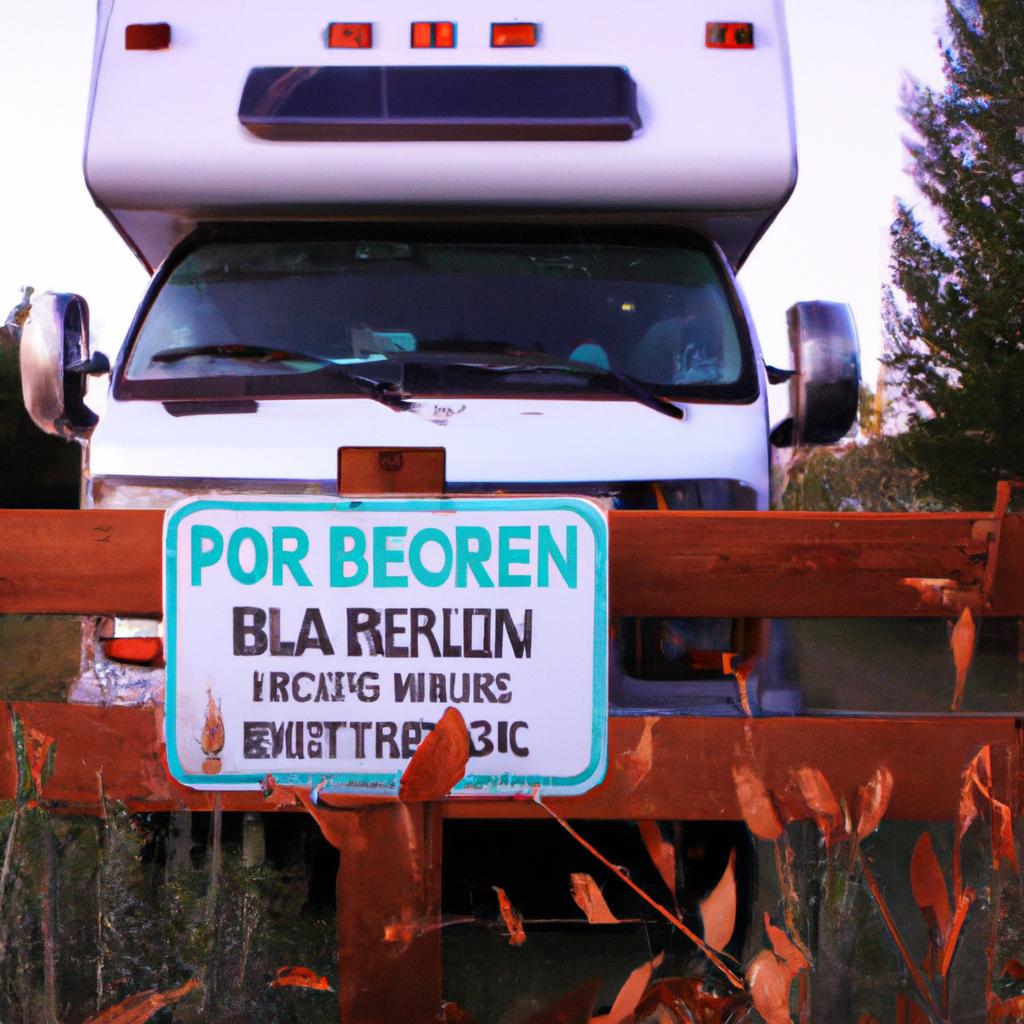Many people enjoy the freedom and flexibility of traveling in recreational vehicles (RVs), allowing them to explore different destinations while still having the comforts of home. However, for pet owners who wish to bring their furry companions along on these adventures, there may be challenges when it comes to finding suitable accommodations. RV parks often have policies in place regarding pets, which can vary widely from one park to another. These restrictions are typically implemented to maintain a safe and enjoyable environment for all residents and visitors.
For instance, consider the case of John and Sarah, a couple who recently purchased an RV with the intention of embarking on a cross-country journey with their beloved dog, Max. They were excited about exploring new places together as a family but soon realized that not all RV parks would welcome Max with open arms. This example showcases the predicament faced by many pet owners seeking to stay at RV parks where certain restrictions may limit or even prohibit pets altogether. Understanding these limitations is crucial for individuals planning RV trips with their pets, prompting further exploration into the various pet-related policies adopted by RV parks across the country.
Types of Pets Allowed in RV Parks
Imagine a family embarking on their first road trip adventure, with an RV as their temporary home. They eagerly pack up their belongings and hit the open road, accompanied by their beloved furry companion. As they begin researching potential RV parks to stay at along the way, they encounter various policies regarding pets. In this section, we will explore the types of pets commonly allowed in RV parks.
Pets Welcomed:
RV parks typically welcome a range of pets, provided they meet certain criteria. The most common types of pets allowed include dogs, cats, birds, and small caged animals such as hamsters or guinea pigs.[^1] These creatures bring joy and companionship to many travelers who appreciate having their loyal friends accompany them during their journey.
- Dogs: Lively four-legged companions that offer unconditional love.
- Cats: Independent feline friends known for their soothing presence.
- Birds: Feathered wonders that add color and melody to any setting.
- Small Caged Animals: Delightful critters loved for their adorable antics.
In addition to these examples, some RV parks may have specific guidelines pertaining to the size and breed of dogs permitted within their premises. Such regulations aim to ensure the safety and comfort of all visitors and prevent disturbances caused by overly energetic or aggressive animals.
To further enhance engagement with our audience passionate about pets, let’s incorporate a table showcasing different characteristics and benefits associated with each type:
| Type | Characteristics | Benefits |
|---|---|---|
| Dogs | Loyal, playful | Companionship |
| Cats | Independent, low-maintenance | Relaxation |
| Birds | Colorful feathers, melodic chirping | Aesthetic appeal |
| Small Caged Animals | Cute, amusing behavior | Entertainment |
Understanding the types of pets allowed in RV parks is crucial for individuals planning their trip with a furry companion. While dogs, cats, birds, and small caged animals are commonly welcomed, it’s essential to review specific guidelines set by each park regarding pet size and breed restrictions. In the following section, we will explore common restrictions on pet breeds within RV park policies without any abrupt transitions between paragraphs.
Common Restrictions on Pet Breeds
Restrictions on pet breeds are a common aspect of policies in RV parks. While some parks may have more relaxed rules about the types of pets allowed, others impose specific restrictions based on breed characteristics. These restrictions aim to ensure the safety and comfort of all park residents, as well as maintain a peaceful coexistence between pets and their owners.
For example, let’s consider an RV park that has implemented certain breed restrictions. One hypothetical case involves a family with a large dog belonging to a restricted breed. Despite being well-behaved and friendly, this particular breed is not permitted within the park due to its size and perceived aggressiveness according to general stereotypes. As a result, the family must either find alternative accommodations or make arrangements for someone else to care for their beloved pet while they stay at the RV park.
To better understand why these restrictions exist, it is important to recognize some key considerations behind them:
- Mitigating potential conflicts: Breed-specific restrictions can help minimize any potential conflicts or incidents that might arise from interactions between different animals or people.
- Liability concerns: Some RV parks implement these limitations to reduce their liability in case of any accidents involving pets.
- Ensuring harmony among residents: By implementing breed restrictions, parks strive to create an environment where all residents feel safe and comfortable around each other’s pets.
- Compliance with insurance requirements: Many RV parks have insurance policies that require them to enforce certain breed restrictions.
This table illustrates examples of commonly restricted dog breeds found in various RV parks across North America:
| Restricted Breeds | Reasoning |
|---|---|
| Pit Bull Terrier | Perception of aggression and strong bite force |
| Rottweiler | Perceived territorial behavior and protective instincts |
| German Shepherd | Size, strength, and sometimes negative public perception |
| Doberman Pinscher | Historical association with guard dog duties |
By understanding the reasoning behind these pet breed restrictions, both current and future residents can be better prepared when considering RV parks with such policies. These restrictions aim to create a safe and harmonious environment for all residents, including those who may not feel comfortable around certain breeds.
Transitioning into the subsequent section on “Size and Weight Restrictions for Pets,” it is important to note that breed restrictions are just one aspect of pet regulations in RV parks. Alongside these limitations, size and weight restrictions also play a significant role in determining whether or not your furry companions will be allowed within the park premises.
Size and Weight Restrictions for Pets
Restrictions on Pet Breeds in RV Park Policies often go hand-in-hand with the overall pet policy of an establishment. While some parks may have more lenient restrictions, others might enforce a strict policy due to various reasons such as safety concerns or potential damage to property. For instance, consider a hypothetical scenario where an RV park has implemented breed-specific restrictions after experiencing incidents involving aggressive behavior from certain dog breeds.
When it comes to enforcing these breed restrictions, RV parks typically rely on visual identification by their staff members. This method can be challenging and subjective, leading to occasional disputes between owners and management regarding their pet’s breed classification. However, parks that employ this approach argue that it is necessary for maintaining a safe and harmonious environment for all residents and visitors.
In addition to breed-specific restrictions, RV parks also commonly impose limitations based on size and weight. These restrictions aim to ensure that pets do not exceed the designated limits set by the park authorities. Such rules are mainly in place because larger animals could potentially cause more significant damage and pose higher risks if they were to become unruly or aggressive.
To further understand the impact of these restrictions, let us examine some emotional responses associated with them:
- Frustration: Some pet owners may feel frustrated when their beloved companion falls within a restricted breed category.
- Disappointment: Individuals who own large dogs may experience disappointment upon discovering that their four-legged friend exceeds the size or weight limit imposed by an RV park.
- Anxiety: Those looking to bring pets into an RV park might face anxiety about whether their furry companions will meet the established criteria.
- Relief: On the other hand, individuals owning smaller breeds compatible with park policies may feel relieved knowing they can enjoy their stay without any complications related to size or weight restrictions.
The table below provides a summary of common breed categories and corresponding restrictions found in many RV parks across different regions:
| Breed Category | Common Restrictions |
|---|---|
| Large Dogs | Restricted or limited numbers |
| Aggressive Breeds | Prohibited |
| Exotic Pets | Not allowed |
| Specific Mixes | Subject to individual review |
As we delve into the next section on “Rules Regarding Pet Leashes and Supervision,” it becomes evident that RV parks implement these restrictions not only for the safety of their residents but also to create an atmosphere where both pet owners and non-pet owners can coexist comfortably.
Rules Regarding Pet Leashes and Supervision
Having discussed the size and weight restrictions for pets within RV park policies, it is essential to consider other rules that govern pet ownership in these recreational settings. This section will explore various regulations regarding leashes and supervision of pets.
Rules Regarding Pet Leashes and Supervision:
The importance of responsible pet ownership cannot be overstated, especially when it comes to ensuring the safety and well-being of both animals and fellow campers. Let us consider a hypothetical scenario to illustrate this point. Imagine a lively dog named Max, belonging to an RV owner who enjoys outdoor activities such as hiking or biking. Without proper leash guidelines, Max may inadvertently cause harm by chasing after wildlife or approaching other campers with fear or aggression.
To maintain orderliness within RV parks while accommodating pet owners’ needs, many facilities have established specific rules related to leashing and supervising pets on their premises. Such regulations typically include:
- Dogs must always be kept on a leash no longer than six feet.
- Owners are expected to clean up after their pets promptly.
- Pets should not be left unattended outside RVs.
- Noise control measures need to be taken if pets become excessively loud or disruptive.
These rules aim to ensure a harmonious environment where all visitors can enjoy their stay without unnecessary disturbances caused by unrestrained animals. By adhering to these guidelines, pet owners demonstrate respect for others’ space and contribute positively to fostering community spirit among fellow campers.
Consider the following reminders about responsible pet ownership while staying at an RV park:
- Always bring waste disposal bags along during walks with your pet.
- Be mindful of noise levels generated by your furry companion.
- Respect shared spaces by keeping your dog on a leash at all times.
- Remember that attentive supervision prevents potential accidents or conflicts.
Table (3 columns x 4 rows):
| Responsible Pet Ownership Tips |
|---|
| Bring waste disposal bags |
| Mindful of noise levels |
| Keep your dog on a leash |
| Practice attentive supervision |
By following these guidelines and incorporating responsible pet ownership practices into their daily routines, RV park visitors can create an atmosphere where both pets and people coexist harmoniously.
As we have explored the regulations regarding leashes and supervision within RV parks, it is equally crucial to address another vital aspect of pet ownership: ensuring pets are up-to-date with vaccinations and licensing.
Requirements for Vaccinations and Licensing
Building on the importance of pet supervision, RV park policies also enforce specific restrictions to ensure a safe and harmonious environment for all residents. By implementing guidelines that address various aspects of pet ownership, these policies aim to strike a balance between accommodating pets and maintaining the overall quality of life within the park.
To illustrate the significance of such restrictions, consider the following hypothetical scenario: A resident brings their large dog to an RV park without any leash or containment measures. The unleashed dog roams freely around the park, causing distress among other campers and potentially endangering both humans and animals alike. This example highlights why it is crucial for RV parks to establish clear regulations regarding pet ownership.
Restrictions on Specific Breeds:
RV parks may have breed-specific restrictions due to concerns related to safety, noise levels, or perceived aggressiveness associated with certain breeds. While controversial, these limitations are put in place with the welfare of all residents in mind. It is essential for potential residents to familiarize themselves with these breed-specific policies before bringing their pets into an RV park community.
Noise Control Measures:
Excessive barking can be disruptive not only to neighboring campers but also wildlife present near the park area. To address this issue, many RV parks require owners to take necessary steps towards minimizing noise disturbances caused by their pets. These measures may include training programs, anti-bark devices, designated areas for exercising pets away from occupied sites during quiet hours, or even enforcing time limits on outdoor activities involving noisy play.
Environmental Considerations:
Protecting the natural surroundings within an RV park is often a priority. Some parks implement restrictions on where pets can roam freely while others emphasize responsible waste management practices. Ensuring proper disposal of pet waste helps maintain cleanliness and hygiene within the park, preventing potential health hazards for both humans and animals.
- Promotes a safe and harmonious environment for all residents
- Considers the welfare of pets and their owners
- Encourages responsible pet ownership within the community
- Safeguards against potential risks associated with certain breeds
Table: Hypothetical Breed-Specific Restrictions at an RV Park
| Restricted Breeds | Reasoning |
|---|---|
| Pit Bulls | Concerns regarding safety |
| Rottweilers | Perceived aggressiveness |
| Doberman Pinschers | Noise levels |
| German Shepherds |
By adhering to these pet restrictions, RV parks ensure that everyone can enjoy a peaceful experience while fostering a sense of accountability among pet owners. However, it is essential to understand the consequences that may arise from violating these policies. The following section will explore such repercussions in detail.
Consequences for Violating Pet Restrictions
Transitioning seamlessly from the previous section, let us now delve into an equally crucial aspect of pet regulations within RV park policies – the restrictions imposed on pets. To illustrate the significance of such limitations, consider a hypothetical scenario where an RV park resident’s untrained dog engages in aggressive behavior towards other animals, causing distress among fellow residents.
RV parks implement pet restrictions to ensure the safety and well-being of all occupants. These regulations are carefully designed to address various concerns that may arise when accommodating pets alongside their owners. Some common examples of pet restrictions found in RV park policies include:
- Breed-specific bans: Certain breeds known for their aggression or potential harm are often prohibited within RV parks as a precautionary measure.
- Size limits: Many parks impose weight or size restrictions on dogs to prevent overcrowding issues and maintain a harmonious environment.
- Noise control measures: In consideration of noise pollution concerns, some parks enforce rules regarding excessive barking or disruptive behavior exhibited by pets.
- Leash requirements: To maintain orderliness and minimize conflicts, most RV parks mandate that pets be leashed at all times while outside designated areas.
The emotional impact of these restrictions can vary depending on individual perspectives and circumstances. Here is a bullet point list outlining different emotions experienced by both proponents and opponents of stringent pet restrictions:
- Relief – knowing that they can enjoy a peaceful stay without disturbances caused by unruly animals
- Frustration – feeling restricted due to breed-specific bans or size limitations
- Security – appreciating the safety measures implemented through leash requirements
- Disappointment – being unable to bring beloved pets along due to certain prohibitions
To further comprehend how these restrictions affect individuals’ choices regarding accommodation options, here is a table illustrating contrasting viewpoints related to varied pet restrictions:
| Pet Restriction | Proponents’ Viewpoint | Opponents’ Viewpoint |
|---|---|---|
| Breed Bans | Ensures safety for all | Discriminatory |
| Size Limits | Prevents overcrowding | Unfair to larger dogs |
| Leash Requirements | Enhances control and orderliness | Inconvenient or restrictive |
In conclusion, pet restrictions within RV park policies play a crucial role in promoting a harmonious environment where both pets and residents can coexist safely. While they may evoke mixed emotions among prospective occupants, these regulations are designed with the collective well-being of the community in mind. By ensuring compliance with such limitations, RV parks strive to provide an enjoyable experience for all their guests.
 Coho Estates
Coho Estates



